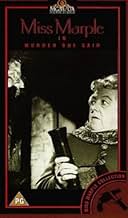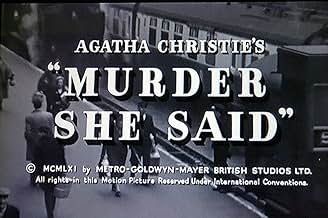Ajouter une intrigue dans votre langueWhen Miss Jane Marple reports witnessing a murder through the window of a passing train, the police dismiss her as a dotty spinster when no trace of the crime can be found.When Miss Jane Marple reports witnessing a murder through the window of a passing train, the police dismiss her as a dotty spinster when no trace of the crime can be found.When Miss Jane Marple reports witnessing a murder through the window of a passing train, the police dismiss her as a dotty spinster when no trace of the crime can be found.
- Réalisation
- Scénario
- Casting principal
- Inspector Craddock
- (as Charles Tingwell)
Avis à la une
What generally makes this movie so delightful is the humorous style which I strongly connected to the classic Ealing comedies. There is also some obvious influence of Hitchcock's early films from his English period, for example the trick of using a woman's scream and a train whistle together very effectively. Good looking sharp photography and fast-paced direction keep things moving . The dialog is very stylish, so "utterly British" for someone from a different language area and a treat for one's ear. I doubt if anyone really talks like that anymore, but hopefully I'm utterly wrong.
And for once I guessed the murderer right beforehand without spoiling any of my fun. On the contrary, the movie gave me such a good time it fully surprised me in that. Judging by this and the trailers of the other films in the series (Yes, hurray, there is more of it!) I'll have to catch up with the rest of them too. Do let your evening be crowned or saved by this wonderful film.
As the first of a wonderful quartet of easy-to-view movies made in black and white in early 60's England (and the second best of them, overall, in my opinion), this appropriately atmospheric film takes us through a clever little screenplay centred around the family of a large estate 'in the sticks' (on the outskirts of London). The storyline is littered with a mixture of eccentric and fundamental cameo parts that serve up the right amount of suspense and partial comedy as Miss Marple (and her buddy, Mr.Stringer) take it upon themselves to solve a railway murder that Inspector Craddock, the local 'head plod', had put down to being the by-product of her rambling 'hallucinations'.
Not surprisingly, we are kept on our toes as to whom was the culprit as the intrepid Jane goes undercover as a geriatric maid who proves to be so competent in her matriarchal manoeuvres that the 'Lord of the Manor' (superbly played, as ever, by the magnificent James Robertson Justice) seeks her hand in marriage as a sort of reward for her spirited detective work. However, Dame Rutherford had Stringer to consider - not least because he was her partner in real life - and there were of course other stories to film in the future...
What a pity they didn't follow Rathbone and Bruce by making around a dozen of these marvellous movies!
The story sticks relatively close to the events in the novel 4:50 from Paddington, with one major exception that may surprise fans of this series who have not read the novels. Christie's Marple was really a sedate, seemingly dithery woman who basically spends most of the books sitting on her backside knitting - in fact, in some of the novels Marple actually gets very little time and is merely on-hand to piece together the clues provided by others and provide the name of the culprit. In this case, screenwriters wisely combined a young character with Miss Marple so she remains front and center in the action. I much prefer these films as opposed to the more traditional renderings from BBC/PBS as Miss Marple is depicted here as such a vital and uniquely active free spirit. Rutherford is simply wonderful with her unforgettable expressions. She plays well off a diversity of people, including the gloriously crusty hypochondriac patriarch James Robertson Justice, the mischievous grandson Ronnie Raymond, the mildly exasperated police inspector Charles Tingwell or the gentle compatriot Stringer Davis.
A delightful series and a testament to a great talent who should never be forgotten.
Murder She Said marked the first big-screen appearance of Agatha Christie's Miss Marple. The script by David Pursall and Jack Seddon is based on the 1957 novel "4:50 From Paddington". Its success lead to three more equally entertaining films starring Margaret Rutherford. Agatha Christie liked Rutherford as an actress but thought that she was all wrong for the part. Indeed Rutherford is nothing like the Jane Marple that Joan Hickson would portray in the highly successful BBC series of the 1980's-90's, but she is a delight to watch as she makes the part entirely her own and earned herself a legion of fans. Incidentally, Hickson appears in this film in a minor role as the miserable housekeeper Mrs Kidder. A great supporting cast includes Muriel Pavlow, Arthur Kennedy and James Robertson Justice. Charles Tingwell plays the hapless Inspector Craddock who cannot bear Miss Marple interfering and solving his cases for him, a role which in which he is featured in all the entries in this series. Another regular in the series is Stringer Davis (Rutherford's real life husband) who plays the local librarian and her closest friend Mr Stringer.
Director George Pollock worked steadily as an assistant director during the forties and fifties and during that time he learned at the feet of some of Britain's most acclaimed directors such as Thorold Dickinson on Gaslight (1940) and David Lean on Brief Encounter, Great Expectations (both 1945) and Oliver Twist (1948). After directing a few trivial comedies such as Village Of Daughters (1961), Pollock had an opportunity with the Marple films to show that he was a very good director investing the films with great British humour as well as intriguing mystery making them timeless entertainment. The films resembled the quota quickies of the 1950's, but they were done with a slightly higher budget, more professionalism and better production values. In addition, Ron Goodwin's music is splendid and the harpsichord laden theme tune would become familiar as it was used in all the other entries in this series. I don't think I would be going over the top to use a well-worn phrase "they don't make them like that anymore". "4:50 From Paddington" has been filmed twice subsequently. In 1987 the BBC gave us a faithful but rather stodgy version starring Joan Hickson and ITV filmed it in 2004 as part of their new series of Miss Marple whodunits starring Geraldine McEwan. But the less said about these the better.
Sequels: MURDER AT THE GALLOP (1963), MURDER MOST FOUL (1964) and MURDER AHOY (produced in 1964 but released in late 1965 to space out the series).
This is the first in it and it evokes the era extraordinarily well, the quick murder and disposal of the body, the old country house, the many suspicious relatives and one of my favourites, James Robertson Justice heading up the entire clan. He even gets to propose to the lady herself, so impressed is he with her detecting.
Add the requisite cute kid, Ronnie Raymond, an excellent bit part by Joan Hickson (the future Miss Marple in the excellent BBC series) and what faults are there to be found in this unique first film of four in the series.
8 out of 10.
Incredibly entertaining, wonderful use of black and white film medium and a really good score.
Le saviez-vous
- AnecdotesThe name of the manor house where Miss Jane Marple conducts her inquiries is called Rutherford Hall in Dame Agatha Christie's 1957 novel. It was changed to Ackenthorpe in this movie to avoid comparison with the surname of Dame Margaret Rutherford (Miss Jane Marple).
- GaffesWhen Jim Stringer gives Miss Marple a leg up to look over the wall, she spots the gardener on the other side. At the same time, Stringer's head appears in the shot although he is supporting Miss Marple. Also the wall is far higher than he is.
- Citations
Ackenthorpe: Cod's as good as lobster any day, and much cheaper.
Miss Marple: Well, that depends on whether or not one has a palate unsullied by cheap opiates.
Ackenthorpe: If you mean what I think you mean, I'll have you know this cheroot cost two shillings!
Miss Marple: Yes. Quite.
- ConnexionsFeatured in Timeshift: Between the Lines: Railways in Fiction and Film (2008)
- Bandes originalesFrère Jacques
(uncredited)
Meilleurs choix
- How long is Murder She Said?Alimenté par Alexa
- What is 'Murder She Said' about?
- Is 'Murder She Said' based on a book?
- Who are the prime suspects?
Détails
- Date de sortie
- Pays d’origine
- Langue
- Aussi connu sous le nom de
- La mano asesina
- Lieux de tournage
- Misbourne Cottage, Village Road, Denham, Uxbridge, Buckinghamshire, Angleterre, Royaume-Uni(Milchester Cottage, home of Miss Marple)
- Sociétés de production
- Voir plus de crédits d'entreprise sur IMDbPro
- Durée1 heure 27 minutes
- Couleur
- Rapport de forme
- 1.66 : 1
Contribuer à cette page





































